Showing 31–35 of 43 results
-
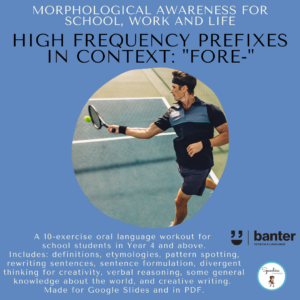
$6.99 including GST
In this 19-page resource, we teach students that the prefix “fore-” means “before” in time, rank, position.
It contains 10 activities designed to teach and consolidate this knowledge. Activities include:
- teaching the definition and etymology of the prefix, “fore-”, for comprehension and spelling;
- a procedural word learning writing activity;
- auditory bombardment – listening to “fore-” words in sentence context;
- a highlighting activity: spotting the prefix in sentences;
- a sentence rewriting exercise requiring students to replace words with a word using the “fore-” prefix;
- a sentence formulation exercise with semantic constraints: making original sentences using words with a “fore-” prefix;
- a divergent naming exercise: creative thinking using words with “fore-” prefixes;
- a general knowledge investigation;
- a verbal reasoning/persuasive writing exercise: generating pros and cons for arguments including “fore-” words; and
- a story-making exercise with “fore-” words.
This resource is one of nine modules covering the most frequent prefixes uses in English. Fully scripted, the module is is suitable for one-to-one, small group and whole class instruction; and can be downloaded in PDF and Google Slides format.
-
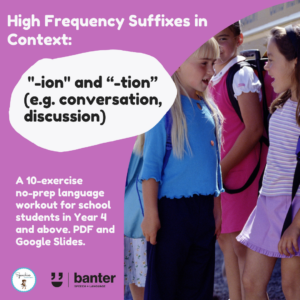
$6.99 including GST
In this resource, we include some of the most common English words ending in the suffix -ion and -tion, as well as common academic words ending in -ion and -tion that are used across subjects at school.
The resource includes 10 activities designed to teach and consolidate this knowledge. See below for an outline of what is included in the resource.
Fully scripted, the module is is suitable for one-to-one, small group and whole class instruction; and can be downloaded in PDF and Google Slides format.
The activities in these resources are suitable for typically developing students in Year 4 and above. They are also suitable for gifted younger students, and older students with language, learning, reading and/or writing difficulties.
-
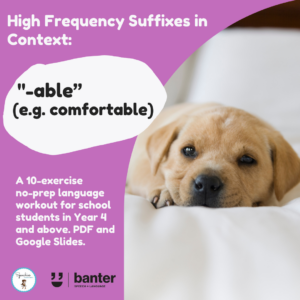
$6.99 including GST
In this resource, we include some of the most common English words ending in the suffix -able, as well as common academic words ending in -able that are used across subjects at school.
The resource includes 10 activities designed to teach and consolidate this knowledge. See below for an outline of what is included in the resource.
Fully scripted, the module is is suitable for one-to-one, small group and whole class instruction; and can be downloaded in PDF and Google Slides format.
The activities in these resources are suitable for typically developing students in Year 4 and above. They are also suitable for gifted younger students, and older students with language, learning, reading and/or writing difficulties.
-
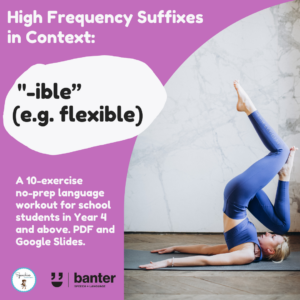
$6.99 including GST
In this resource, we include some of the most common English words ending in the suffix -ible, as well as common academic words ending in -ible that are used across subjects at school.
The resource includes 10 activities designed to teach and consolidate this knowledge. See below for an outline of what is included in the resource.
Fully scripted, the module is is suitable for one-to-one, small group and whole class instruction; and can be downloaded in PDF and Google Slides format.
The activities in these resources are suitable for typically developing students in Year 4 and above. They are also suitable for gifted younger students, and older students with language, learning, reading and/or writing difficulties.
-
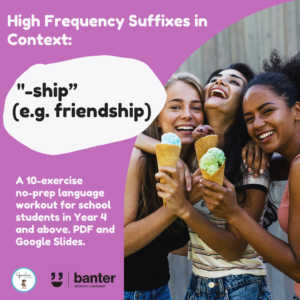
$6.99 including GST
In this resource, we include some of the most common English words ending in the suffix -ship, as well as common academic words ending in -ship that are used across subjects at school.
The resource includes 10 activities designed to teach and consolidate this knowledge. See below for an outline of what is included in the resource.
Fully scripted, the module is is suitable for one-to-one, small group and whole class instruction; and can be downloaded in PDF and Google Slides format.
The activities in these resources are suitable for typically developing students in Year 4 and above. They are also suitable for gifted younger students, and older students with language, learning, reading and/or writing difficulties.





